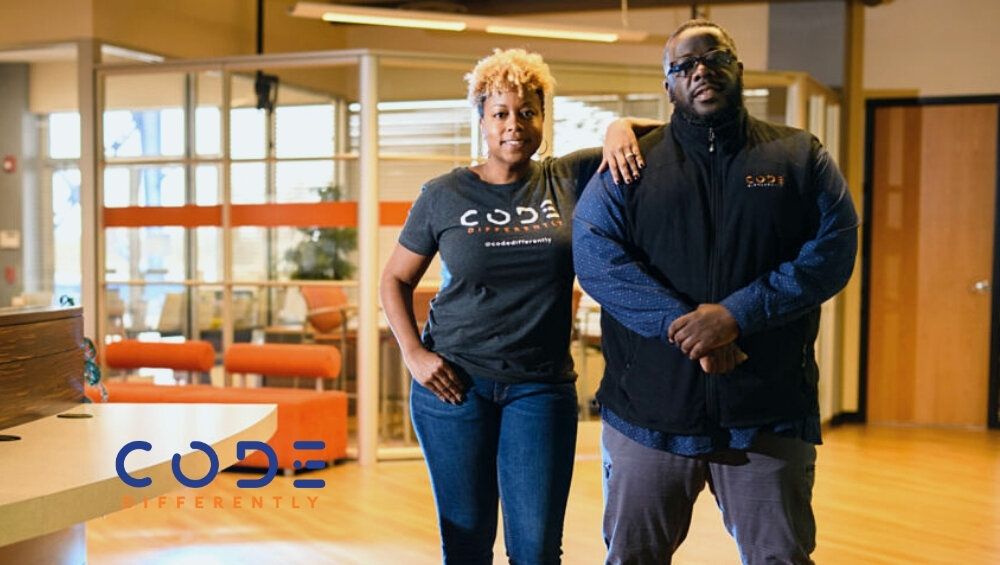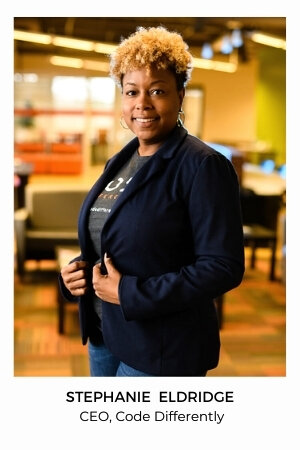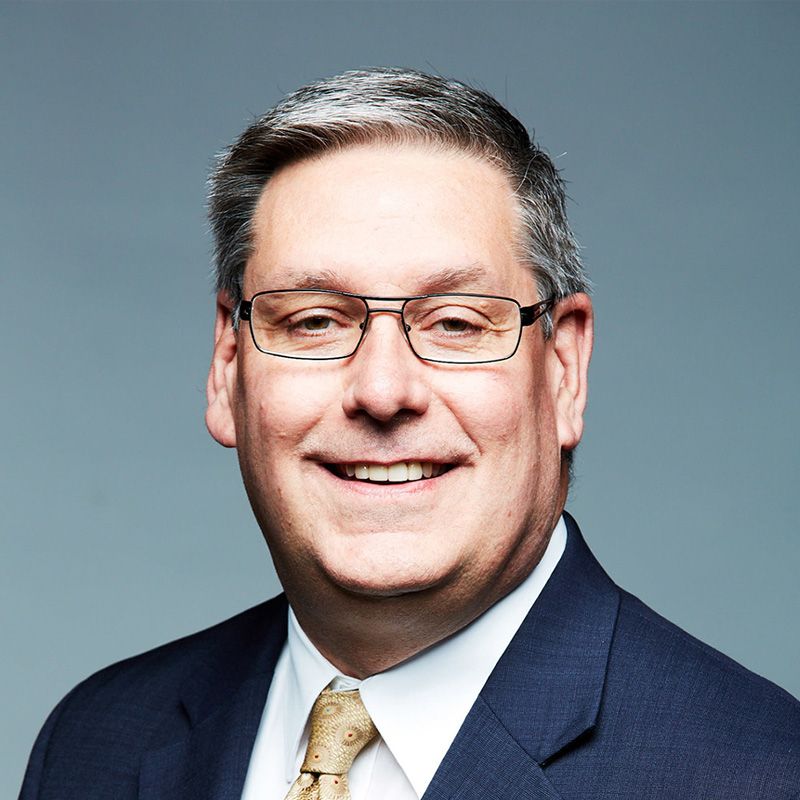Meet Stephanie Eldridge, Code Differently Co-Founder and CEO

Just two years ago, CEO Stephanie Eldridge and CIO Tariq Hook launched the learning center Code Differently, and their impact since cannot be overstated.
In the technology sector, women represent 25% of the workforce while Black females represent only 3% and Hispanic females only 1%. Code Differently aims to increase diversity within the technology workplace. Enrollees range from adult college computer science or engineering majors to high school students. The makeup of Code Differently’s classes are 98% Black and Latinx, and within that 40% are female.
“Diversity and inclusion has not only been a part of our mission from the beginning,” Eldridge says, “it’s frankly been a part of our lives.”
Eldridge grew up in Aliquippa, a small town in Western Pennsylvania that she describes as “a tech desert.” Aliquippa is a blue-collar town that was once booming with steel mills. Once the steel mills declined, the economy declined and the educational system was impacted. Her time in Aliquippa became the foundation that motivated her into creating a different possibility.
Attracted to Delaware’s Ideal Mid-Atlantic Location
Eldridge attended Morgan State University, one of the United States’ Historically Black Colleges and Universities (HBCUs), which at the time graduated the most Black engineers in the nation. She arrived in Delaware based on geographic convenience.
“My boyfriend at the time, now my husband, was living in Philadelphia, and I was working in the Baltimore/D.C. area,” she recalls. “We decided Delaware was the perfect midpoint.”
 Eldridge and Hook were both working as technologists in Delaware when they met. She was an executive director at JPMorgan Chase at the Delaware Tech Center, and he was an executive director of education at Tech Impact. Code Differently is now on the Wilmington Riverfront, in the New Castle County Chamber of Commerce building’s Emerging Enterprise Center.
Eldridge and Hook were both working as technologists in Delaware when they met. She was an executive director at JPMorgan Chase at the Delaware Tech Center, and he was an executive director of education at Tech Impact. Code Differently is now on the Wilmington Riverfront, in the New Castle County Chamber of Commerce building’s Emerging Enterprise Center.
“The great thing about Wilmington is, if you need to catch a train, you are right there downtown,” Eldridge says. “You can be in Philly, Baltimore, D.C. and New York faster than you could drive.”
Code Differently’s 2020 cohort has 43 students, 10 of which are from Delaware State University.
The intention was to have all 43 here in Delaware for the summer “to see all of the great things about Wilmington and Delaware itself,” Eldridge notes. Unfortunately, the COVID-19 pandemic made this impossible.
Seven of the 21 Code Differently students from last year ended up relocating to Delaware after recognizing the opportunities and resources here.
“We are great creators of technologists here in Delaware,” Eldridge says, “but we’re also great importers of technologists.”
Eldridge is reminded constantly about the benefits Delaware has provided for their business.
“I don’t know another location where you are one degree of separation away from any need,” she says. “When we look outside of our windows, we see the backdrop of the companies that we serve most. When I look to the left, I see JPMorgan Chase, the top employer of our university program, and the Barclaycard and Capital One buildings, who support our high school work-based learning program along with JPMorgan Chase. It is really helpful that the decision-makers from these companies are actually located in Delaware.”
Code Differently – Fueled by a Powerful Network
The most powerful piece of Code Differently is their network.
“We are able to rely on diverse people who are already in the technology industry, and that network has increased tenfold over the last year,” Eldridge says. “So we have this family of corporations willing to help guide each student in ways that were not traditionally available.”
The number of small businesses that are downtown also has been a win-win.
“It gives us a vision for where people started and where they can go, the importance of supporting people in your network,” Eldridge says. “We love collaborating with other businesses at The Mill or meeting clients at The Green Box. We take full advantage of the uniqueness that small businesses like us have to offer.”
Having been challenged with fitting people into boxes that aren’t one-size-fits-all, Code Differently decided to build their programs, well, differently. For example, approximately 80% of those in Code Differently’s university programs work 30 hours or more each week while they are in college. This means less time to focus on studies and often lower GPAs. Many also have less access to the technology needed to excel in those classes.
“Imagine you are a computer science major, COVID hits and you are at home, and now you have no access to the computer lab in your university,” Eldridge says. “We try to remove those barriers. We provide a stipend so they don’t have to work, we provide them with equipment and internet access, and we focus on their professional development.”
The majority of students at Code Differently are first-generation college students. Many of them “come from families that don’t have the life experience or coaching on how to operate in corporate America,” Eldridge notes.
Code Differently looks at themselves holistically within the tech field. “We don’t want to be all things to all people,” Eldridge says. “If there are programs already out there that we could partner with, we do.”
For example, Code Differently partnered with the New Castle County Summer Youth Program. They came up with the idea that, instead of just having the students work in the brick and mortar location, they could create a software development shop that could teach high school students how to create websites and mobile apps as a work-based learning experience. Partnering with the New Castle County government and the Meyer Administration has been a major game-changer for the local youth.
“There are very few internships and apprenticeship opportunities for high school students in tech,” Eldridge notes. “So right now we have 40 students working with us, virtually, from 12 to 5 p.m. every day. And we are able to work with our partner companies — JPMorgan Chase, Barclaycard, CSC and local small businesses we have in our network to provide mentorship or real projects for our kids so they are getting real work experience. And by bringing in real engineers and developers to talk to the students, real relationships and experiences are occurring organically at the high school level.”
In addition to corporate partnerships, the Department of Labor, New Castle VoTech, Colonial School District, and Rodel Foundation are contributors to this effort. “It’s a great example of a private/public partnership that benefits the future career choices and development of teens,” Eldridge says.
The Results Speak for Themselves
The results speak for themselves, and Code Differently has begun shifting the statistics that go back to the beginning of technology. “Out of the last group of high school students that have since graduated, every one of them is going on to higher learning and 80% are going into computer science or IT-related fields. And this becomes a pipeline for colleges that we partner with, like Delaware State University, who will begin providing university mentors for our program.”
What single change would she like to see in the Delaware School system?
“Embed technology in any subject that is taught in a school district,” she says without hesitation. “If you want to be an investment banker, you need to know how to write scripts to analyze data. If you want to open a restaurant, having an understanding of what goes into an ordering app or reservation system, especially in situations like the one we are in, is essential.”
“Technology is embedded into everyday life. It is an accessory to everything we do. If COVID has taught us anything, it is that the way we continue to run society is through technology.”
Eldridge believes that the biggest misconception about technology is that it is too hard – and that anything with great reward takes work. A lot of people feel defeated when they hear the word “coding,” she says, so she’ll use more relatable phrasing, such as inviting potential participants to come help “build a mobile game using technology.”
“In the Black community, the biggest misconception is ‘I can’t do it’ which has its reasons,” Eldridge says. “There are not enough people in the industry that look like Tariq and me to give them the confidence that they could possibly do it.”
Using Delaware and its location, resources, and community as a springboard, Code Differently is changing the face of technology with velocity and passion. Code Differently is now working with New Castle County to expand efforts to reach adults who are facing employment challenges and require job training to enter the technology field. Eldridge expects the venture to succeed.
Why? Because the mantra Eldridge likes to share about Delaware is, “We get things done here.”
This article was originally posted on the LiveLoveDelaware.com website: https://www.livelovedelaware.com/delaware-ambassadors/stephanie-eldridge/
Newsletter Sign Up
Stay Up To Date With Delaware
